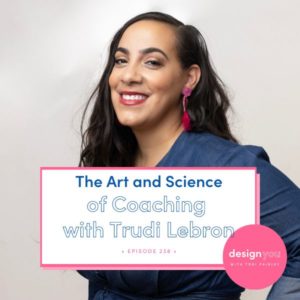
Y’all it is all happening around here! We have a new website, we’ve built an entirely new company and there is so much going on right now. One of the people who has been so instrumental in helping me create this new version of my company, myself, and my coaching is the fabulous Trudi Lebron, so I’m so excited to welcome her back to the podcast this week.
As you may already know, Trudi is the Founder of The Institute for Equity-Centered Coaching®️ where I have been going through her equity-centered coach and leadership certification for the last 18 months. She is a coach, entrepreneur, and writer who works in the intersecting space around diversity, equity, inclusion, and anti-racism and works to advocate for better business and overall practices. Trudi is on a mission to create a world where people’s life outcomes aren’t predictable by their race and zip code, and she joins me this week to dive deeper into the art and science of coaching.
In this episode, hear more about Trudi and the incredible work around equity, inclusion, and diversity that she does in the world. Hear more about the transformation that coaching can bring to people, the difference between coaching and how it is sometimes being portrayed within influencer and cancel culture, and more about Trudi’s developments in the art and science of coaching.





